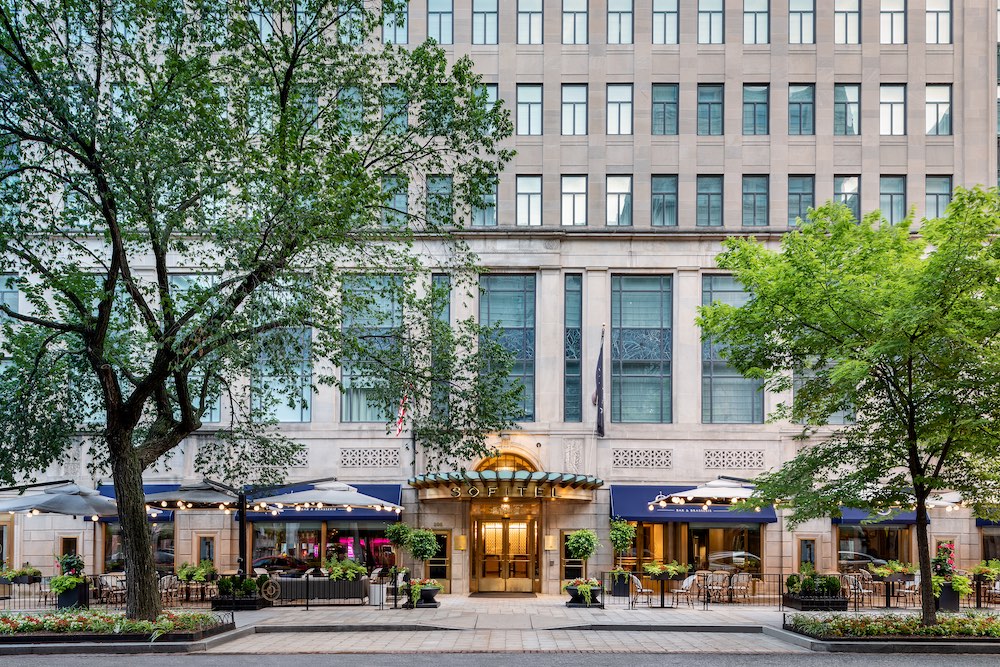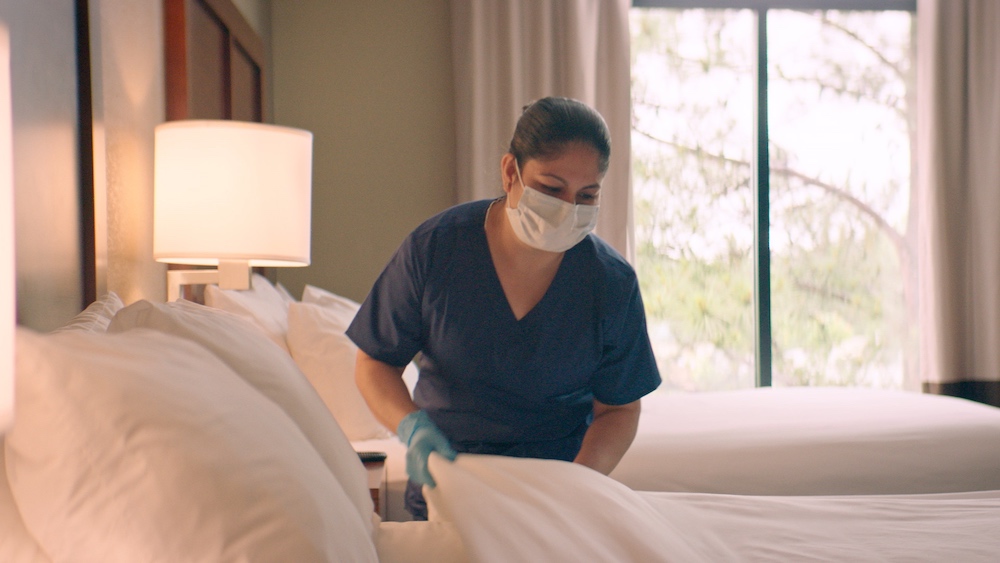Occupancy rates indicate signs of recovery following the impact of the pandemic on the hotel industry, and major hotel groups share their updated safety protocols and outlook for hospitality professionals.
It’s been six months since the travel industry came to a near standstill as the COVID-19 virus spread across the world. In that time, hotels shut their doors as people could no longer cross borders and travel was limited. Thousands of hotel workers lost their jobs. And the hotel industry had to learn how to reinvent itself.
The numbers tell the story of an industry still in crisis mode. For the week ending Sept. 19, the occupancy rate for U.S. hotels was 48.5%, according to the research firm STR. For the same time in 2019, 71.3% of hotel rooms were filled.
But there are signs of recovery.
Many of Marriott International’s hotels that had closed temporarily have reopened. At the end of the second quarter of this year, more than 91% of hotels worldwide were open compared to 75% in April. Marriott has more than 7,300 hotels worldwide and reported that in August, RevPar (Revenue Per Available Room), a key indicator of fiscal health, was down 63% year over year. That’s a significant drop but better than its low in April, when RevPar had dropped 90% year over year.
As of late September, 98 of Accor’s properties in North and Central America were open, representing more than 80% of the hotels in that region. Heather McCrory, CEO of North and Central America for Accor, said the company aims to have more than 90% open by the end of October.
“Our occupancy levels are on par with market levels,” she said. “Fortunately, we have not had to significantly adjust our room rates. We have had success with creative packaging.”
Heather said the meetings sector, which is usually where hotels make a significant chunk of their revenue, is still lagging. Her hopes have been buoyed by a few requests for small meetings and a growth in inquiries for larger meetings for the second half of 2021.

Choice Hotels kept 90% of its properties running during the worst weeks of the pandemic. By the last week of September, nearly 100% of the group's hotels were open. Occupancy levels at Choice’s domestic hotels dropped to the lowest rate in early April — 28%. But by the last week of June, the rate rose to more than 50%, with extended stay hotels performing the best.
“Our hotels attract a higher proportion of leisure travelers, representing over 80% of all room nights and are not as reliant on group business from meetings and conventions,” said Pearl Amaechi, public relations coordinator at Choice.
Hilton reported in its second quarter earnings report that 96% of its more than 6,200 hotels worldwide had been open as of July 31. The system-wide occupancy rate for the quarter ending June 30 was at 22.3%.
Smaller hotel chains and independent properties are also making a comeback. The Rocco Forte Hotels Collection of 15 luxury hotels and resorts officially reopened four hotels in September: Brown’s Hotel in London, Hotel Amigo in Brussels, Hotel Savoy in Florence, and Hotel de la Ville in Rome.
Hotels in the Caribbean are also slowly reopening. The Belmond Cap Juluca, Anguilla, will reopen on Nov. 1; the Belmond La Samanna, St. Martin, will resume operations on Nov. 2; The Christopher, St. Barth, will return Nov. 24.
Safety Precautions
In order to reopen, hotels have had to drastically change the way they operate in order to ensure the safety of their employees and guests. Major hotel chains are requiring face masks in all public areas.
Marriott instituted the Marriott Global Cleanliness Council consisting of in-house and outside experts in food and water safety, hygiene, infection prevention and hotel operations. New cleaning technologies include electrostatic sprayers and disinfectants recommended by the Centers for Disease Control and Prevention and the World Health Organization.
Hilton CEO Chris Nassetta said during the second quarter earnings call that large group meetings have been pushed into next year. Still, the company has launched Hilton EventReady with CleanStay which sets new standards for cleanliness and customer service for meetings and events. CleanStay is a new cleaning program in partnership with RB, the maker of Lysol, and Mayo Clinic. Through the Hilton Honors app, guests can choose their rooms from hotel floor plans, check in digitally and use their phones as keys.
“While we originally developed it as a convenience for guests, it’s now enabling us to provide a contactless check-in process,” said Nigel Glennie, a spokesman for Hilton.

Choice has a Commitment to Clean initiative with enhanced cleaning procedures in high-traffic areas such as the front desk, fitness centers and pools using hospital-grade disinfectant approved by the U.S. Environmental Protection Agency. A new check-in process promotes social distancing. Furniture is arranged to encourage social distancing, and there are hand sanitizing stations in public spaces. Every Choice-branded hotel will have a designated “Commitment to Clean Captain” to communicate new protocols to staff.
Globally, Accor in May launched the ALLSAFE label of cleaning standards and operational procedures that were vetted by Bureau Veritas, a company that provides testing, inspections and certifications. The company also partnered with insurance company AXA to provide free access to medical consultations.
Accor North and Central America also launched AllMeetWell.com, an interactive platform for meeting planners and attendees to inform them about the new health and safety measures.
Hotels are also developing activities that guests can enjoy while staying safe. Rocco Forte Hotels, for instance, is offering new services to provide guests more privacy. It has a new partnership with VistaJet for more private VIP offerings. Brown’s Hotel has teamed up with Pashley Cycles, a bicycle manufacturer based in England, to provide vintage bicycles, a bike safari itinerary and picnics so guests can get outdoors.
Opportunities in the Hospitality Field
The industry is learning how to implement all these changes with fewer employees. In its latest research, the American Hotel and Lodging Association found that 68% of hotels have less than half of their pre-crisis full-time staff. And 74% said they would have to lay off more employees unless they get government stimulus aid. The results were based on a survey of more than 1,000 hotel owners, operators and employees that was conducted from Sept. 14 to 16.
But there are glimmers of hope.
Some Accor properties, particularly resorts, have started recruiting talent to serve as frontline team members, housekeepers, servers, groundskeepers and more. There are also new positions related to enforcing new safety protocols and security. The company is focusing recruiting efforts on local employees.
Heather said the employees’ roles and responsibilities have expanded to involve more community support efforts related to the pandemic, increased training and the creation of safer hotel offerings such as drive-through events at hotels.
“Hospitality professionals have typically been sought after as top talent due to their passion for taking care of people, creating and facilitating unique experiences, and the transferable skills they have amassed while on the job,” she said, adding that hospitality employees could also find work in other fields.
“Opportunities that require customer service, empathy and relationship building, problem solving, teamwork, innovation, time management, multitasking and detail-oriented skills will benefit from hiring hospitality professionals in various industries, including but not limited to project management, customer success and retail.”
Nigel said that the hotels and franchise owners are assessing their staffing needs “based on a forward view of bookings and their local business environment, as well as guidelines from local and international governments and health authorities.”
Helping Frontline Workers
Meanwhile, hotels are still trying to give back to their communities. At the height of the pandemic, the Accor hotels that had to shut down to the general public partnered with local organizations to offer frontline workerss accommodations, food and supplies such as gloves. Fairmont Royal York in Toronto, part of Accor, donated up to 500 rooms per night, opening up more than 10,000 room nights between April and June. Sofitel Los Angeles at Beverly Hills stayed open to about 150 Cedar-Sinai medical personnel a night. Several Accor hotels in North America are still offering discounted rates to frontline workers through the end of the year.
Hilton and American Express donated up to 1 million hotel room nights across the U.S. for frontline workers. While that program has ended, Hilton has launched a Frontline Thanks program offering discounted rates for them.
Since April 1, more than 313,000 room nights were booked at the Choice Cares rate, a discount for essential workers and volunteers helping communities during the crisis. The rate is not active anymore, but many hotels are still housing first responders.
Marriott has established a Thank You Community Caregiver program at participating hotels across the U.S., Canada, the Caribbean and Latin America. The special rate applies to first responders and healthcare workers though Dec. 31.
Turn your passion into a career with a diploma in Hospitality & Hotel Management.




